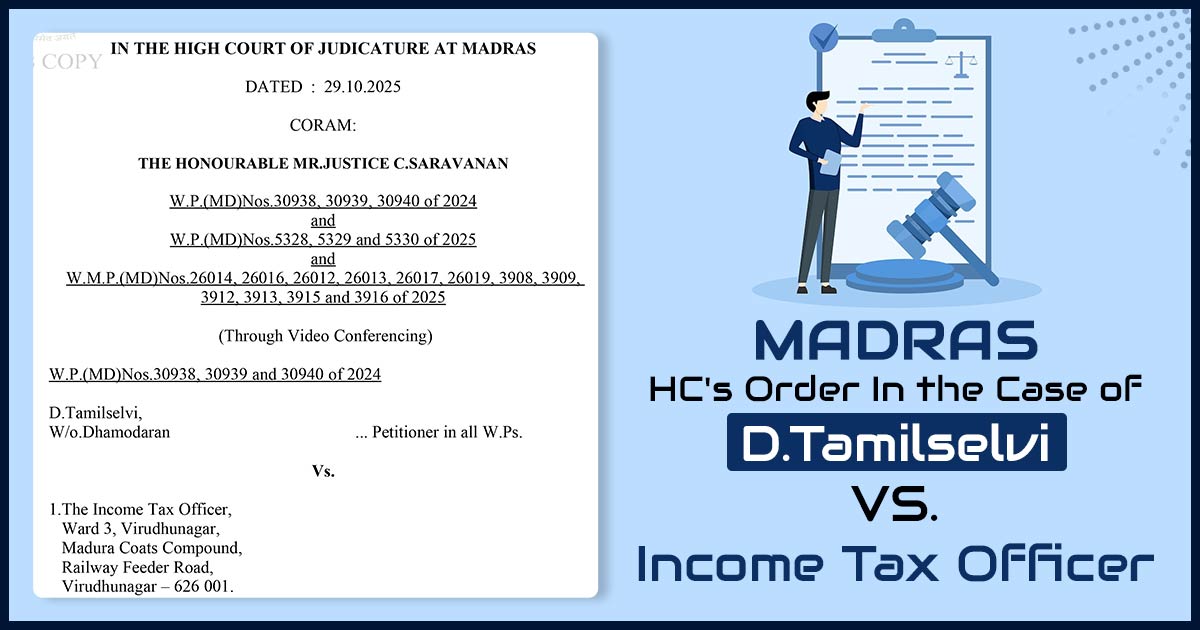
The Madras High Court ruled that under the new income tax regime, approval from a higher authority, like the Principal Chief Commissioner of Income Tax or the Principal Director General, is obligatory to issue a notice u/s 148 of the Income Tax Act after the lapse of a three-year limitation period.
Justice C. Saravanan mentioned that three years from the finish of the AY 2016-2017, 2017-2018, and 2018-2019, to issue Section 148 Notice under the new regime had already lapsed, dated 31.03.2020, 31.03.2021, and 31.03.2022.
However, Section 148 Notices were issued for such Assessment Years only on 29.07.2022 with approval from the Principal Commissioner instead of approval from the Principal Chief Commissioner as per amended provisions as in force for the period in dispute were in time.
The issue of (A.Y. 2016-2017 to 2018-2019) Notices issued u/s 148 of the Act as it stood before 01.04.2021 and on account of the complication because of interpretations placed by the Supreme Court in Union of India v. Ashish Agarwal, (2023) 1 SCC 617, on the limitations under the new tax regime with effect from 01.04.2021 in Chapter XIV of the Income Tax Act.
Taxpayer, within the new regime, the competent authority for approval of sanction for issuance of notice u/s 148 of the Act for the period from 01.04.2021, the appropriate authority is the Principal Chief Commissioner or Principal Director General or Chief Commissioner, or Director General, if from the end of the assessment year more than 3 years have expired.
Hence, before approval is granted via the Principal Commissioner, it is grossly invalid and illegal and amounts to a lack of jurisdiction.
As per the revenue, the Proviso to section 151 of the act mentions that for the objective of computing the year limitation period for getting sanction, the duration of stay and the time granted to the taxpayer for filing a response should not be included. From the mentioned authority, as mandated under section 151 of the Act, the sanction was also duly obtained.
Case Background
Post roll-out of the new provision w.e.f 01.04.2021 in Chapter XIV of the Act, notices were issued under section 148 of the Act where income had escaped assessment.
Under Section 148 of the Act, notices were issued under the old regime as in force till 31.03.2021. Subsequently writ petition was submitted in the distinct High Courts, where notices issued on or after 01.04.2021 under the old regime as in force till 31.03.2021 were contested.
The case arrived to the Apex Court in Union of India v. Ashish Agarwal where it was carried that the notices issued u/s 148 of the Act as in force till 31.03.2021 between April 1, 2021 and June 30, 2021 were considered to have been issued in the period were stayed till the date of supply of the pertinent information and material by the Assessing Officer to the taxpayer.
The Apex court in the Rajeev Bansal case held that the effect of the legal fiction and the directions issued via the Apex court in the Ashish Agarwal case was that the time commences to run for a taxpayer to answer to SCN post the supply of the related material and data to the taxpayer.
High Court Observations
For the taxpayer’s case whose income has not undergone assessment, where the assessment year shall have come within the four-year limitation under the old regime could not proceed till an approval is obtained from the mentioned authority u/s 151(ii) of the Act.
But under the norms of section 151 of the act, the 3-year duration for the objective of clause (i) will be calculated post considering the limitation period as not included under the third or fourth, or fifth provisos or extended by the sixth proviso to sub-section (1) of Section 149 of the Act inserted vide Finance Act, 2023.
As a sanction was received from the Principal Commissioner of Income Tax and as more than 3 years have expired, the notices issued u/s 148 of the Act and orders passed, and the notices issued u/s 271(1)(c) are obligated to be set aside, the bench cited.
The bench for the above remitted the case back to the department to issue a fresh notice u/s 148 of the Act, post receiving sanction from the Principal Chief Commissioner of Income Tax or the Principal Director General, as is specified u/s 151 of the Act.
| Case Title | D.Tamilselvi vs. Income Tax Officer |
| Case No | W.P.(MD) No 30938 of 2024 |
| For the Petitioner | Mr P.Madhavan |
| For the Respondents | Mr N.Dilip Kumar |
| Madras High Court | Read Order |